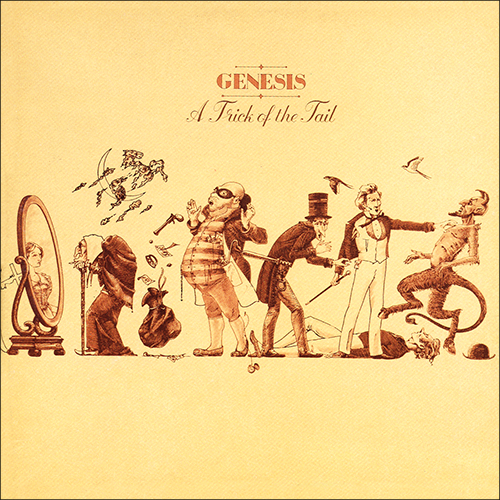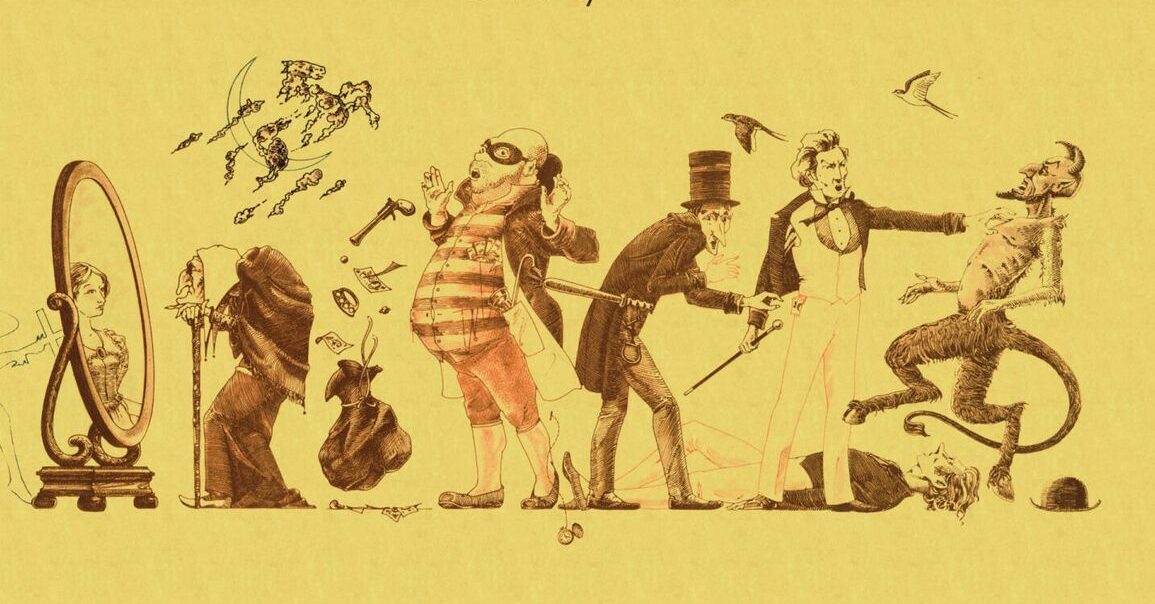- Article
- Read in 8 minutes
Genesis – A Trick Of The Tail – review
When Peter Gabriel left the band in 1975 Genesis had to reorientate and restructure. Though it was developed by a provisional band line-up, as it were, it is an album that has gained great recognition by fans and critics alike.
After five fantastic albums that opened a whole new chapter in the history of progressive rock music and hundreds of successful live performances the inevitable happened: Peter Gabriel played his last gig with Genesis in Besancon, France, on May 22, 1975. When Melody Maker put the question “Gabriel out of Genesis?” on its title page the cat was out of the bag for at least the British public, and the experts began to wonder: Genesis without Peter Gabriel – (how) will that work?
Peter Gabriel had determined the public perception of the group for years through his characteristic vocals and eccentric stage performances. Though he kept protesting that Genesis had always been a songwriter’s collective, the media felt certain that Peter Gabriel was Genesis. This misunderstanding and the resulting division (by the public) into “the star” and “his backing band” were certainly an important factor that led to the eventual split.
The remaining band members Tony Banks, Phil Collins, Steve Hackett and Mike Rutherford never had a doubt that they would continue. Genesis would cope well with the second major loss after Anthony Phillips’ decision to leave in 1970; in fact, they would only grow stronger. What direction they would go in was not so clear to the band, though. Initial ideas to work as a purely instrumental four-piece without any vocals were soon dropped.
Soon after Genesis had finished the Lamb Lies Down On Broadway tour they began to work on their new album A Trick Of The Tail. Soon they realized that they needed a singer, so they began to look for one and invited dozens of candidates for a try-out but were happy with none of them. This process must have been very frustrating for the band. Phil Collins was tasked with teaching the candidates the melody of the songs. Singing was nothing new for Collins. He had sung lead vocals on For Absent Friends and More Fool Me, after all, and his voice doubling Peter Gabriel’s had always been an important element on stage, proving essential for the Lamb Lies Down On Broadway tour.

Tony Banks and the other felt certain that Collins could sing some of the quieter songs on the new album without any problems, but they did not believe his choirboy voice could deliver the harder songs. Besides, he was the drummer and they did not want to change that. As time went by and as the new album took shape and as the last candidate had been rejected Collins took the microphone and had a go at Squonk. Lo and behold, it sounded better than what they had heard before! The rest is history: Phil Collins became the singer in Genesis and laid the foundation for his later superstardom.
Back to A Trick Of The Tail. When they had finally found a singer the band went into Trident studios, London, to record their seventh studio album with producer David Hentschel. Tony Banks described working on the new album as “very refreshing”. With the eccentric Gabriel gone the music came to the fore again and the band were absolutely bursting with ideas. The fact that there were only four writers left meant that there was less friction in their democratic process of song-writing.
Dance On A Volcano
The record begins with the famous intro written by Hackett and Rutherford. Clean guitars, powerful bass and Collins’ breezy drumming point out the musical direction. The verses are full of odd time signatures, and the songs ends with a furious, quirky and complex bit that belongs to the most fiddly Genesis have ever produced. Dance On A Volcano is a song with lots of variety, a real hammer, and you can feel the band’s new self-confidence in every note. Collins’ vocals fit the song very well – after this one song one has almost forgotten that Genesis ever had had another singer.
Entangled
Things calm down after this tour de force. Entangled weaves a delicate net in 6/8 with 12-string guitars and vocals with lots of echo. This pastoral mood is underlined by a couple of notes from Banks’ new Arp Pro Solo synthesizer. This instrument takes the lead towards the end, and Banks plays a solo that slowly grows. The full mellotron choirs in the background make you feel as if you were in a cathedral, and everything is developing towards a culmination where….

Squonk
… suddenly the first notes of Squonk slam violently out of the speakers. Banks and Rutherford were inspired to write Squonk by the Led Zeppelin song Kashmir. They wanted to reproduce its towering drums and shuffling beat on the album, and Collins has done a good job. The drums join forces with Rutherford’s strong bass pedal to concoct a sound that thunders through your living room and frees your ears for new sounds in the Genesis cosmos. Squonk can be seen as Genesis’ first flirt with the bombast or stadium rock they have always been accused of making. Phil Collins would redefine rock and pop drumming with this kind of playing.
The story of Squonk links back to the legends and fairy tales from Genesis’ older songs. The squonk is an American mythical creature that lives in the forests of northern Pennsylvania. It is said to be so ugly that it dissolves, when caught, into a “pool of bubbles and tears”.
Mad Man Moon
What follows is a typical Tony Banks composition. Banks had written this song on his own with a view to a solo album and brought it as a whole to the recording sessions. The appeal of the song lies in the brilliant piano and its almost classical flair. Collins wistful vocals spread a melancholy that occurs on many songs on this album. The middle of the song consists of an orchestral instrumental that is opened by castanets. The complex piano part that follows must have been recorded in a series of overdubs which, sadly, makes this song impossible to play live. The song picks up speed again after the instrumental before it loses itself in the initial melancholy and fades quietly in flute and piano sounds.

Robbery, Assault And Battery
Robbery, Assault And Battery is a penny dreadful set to music. Collins sings in various characters; in fact, the song continues traditions of other pieces that were very rich in words, like Get’ Em Out By Friday or The Battle Of Epping Forest. It is rather simple musically. A brief keyboard solo around the middle is a high point. The rhythms of Robbery…vary and there is a hint of bombast with mellotron chords and light-footed bass lines by Rutherford. All in all it is an average song by the standards of Genesis.
Ripples
This song, on the other hand, is revered by many fans. It was the big surprise in the setlist of the reunion tour 2007. Ripplesis a quiet song. Collins sings his lyrics full of longing accompanied by acoustic guitars and piano. Here we have the melancholy again. It may conjure up the image of a thoughtful old man who looks at the sea and watches the waves. Steve Hackett’s guitar suddenly surfaces in the instrumental part. Tasteful long chords complete the image. Collins languishes again as the song sails into the fade-out, nearly missing the shoals of kitsch.
A Trick Of The Tail
The title song was also the single. Tony Banks wanted to bring out the lighter, weirder side of Genesis with this song he had written quite some time before. He succeeded, particularly if you consider the promo video for the song in which Phil Collins turns into a dwarf wearing a bobble hat and explores the inside of a piano while Hackett suddenly grows giant hands. If you leave that out A Trick Of The Tail is a songlet rather than a full-grown song, and it is not the kind of song that would have made Genesis famous.
Los Endos
Los Endos picks up various melodies from the album and assembles them to a new song that can stand on its own. The piece cannot deny influences from the fusion and jazz rock Collins had brought back from his Brand X escapades. The Squonk reprise at the end bids Genesis farewell at full power and it also quotes a line [or two] from Supper’s Ready. A reference to the past at the end of an album that represents the departure into a new era? Los Endos is definitely one of the best instrumentals Genesis have ever recorded and a live classic to this day.
Here it is, then, the first album of the post-Gabriel era. What do we gain from it? First of all the reassuring realization that Genesis lives! Yes, they are, and perhaps more so than ever. Never before A Trick Of The Tail were Genesis this dynamic, this powerful, and this melancholic. The music has grown less intellectual, too, it increasingly addresses simple emotions. Parts of the album sound more spontaneous, perhaps even more improvised than before. Here and then we glimpse some elements that point in the rock/pop direction the band would take later. Tony Banks is obviously the main songwriter which would lead to unsurmountable differences with Steve Hackett and his leaving the band after the succeeding album.

Dance On A Volcano, Ripples and Los Endos have become classics that made up the back bone of many, many shows. Next to them we also find material that is less strong such as Robbery, Assault And Battery and the title song. To call them “weak” would mean you’re really looking for things to complain about because this is one of the strongest albums in the whole Genesis discography. One reason for this is a certain basic mood that is evident in almost all songs and provides a common ground between the individual tracks.
Which leaves two questions: How is the new album received by the public, and how will can it be played live? After rather mixed reactions to The Lamb Lies Down On Broadway critics and fans alike were happy with the album and particularly with the new singer Phil Collins. It became clear that he would also sing in live concerts. In Bill Bruford (Yes, King Crimson…) Genesis found an excellent drummer to take over Collins’ instrumental parts on stage. Since Collins would return to his drumkit at every opportunity his singing duties left him they developed the famous double drumming which would augment the list of attractions a Genesis concert could offer.
Collins was very nervous before his first performance, wondering whether the audience would accept him as the new front man. The most interesting question was how Collins would work through the breaks between the songs in which Peter Gabriel would tell the odd story. It turned out very quickly that Collins had everything under control with his humour and talent for acting. When Gabriel left Genesis lost his peculiar vanguard charm on stage, but they gained a real entertainer, another founding stone on their way to becoming one of the most successful bands of all times.
by Sebastian Wilken
translated by Martin Klinkhardt

